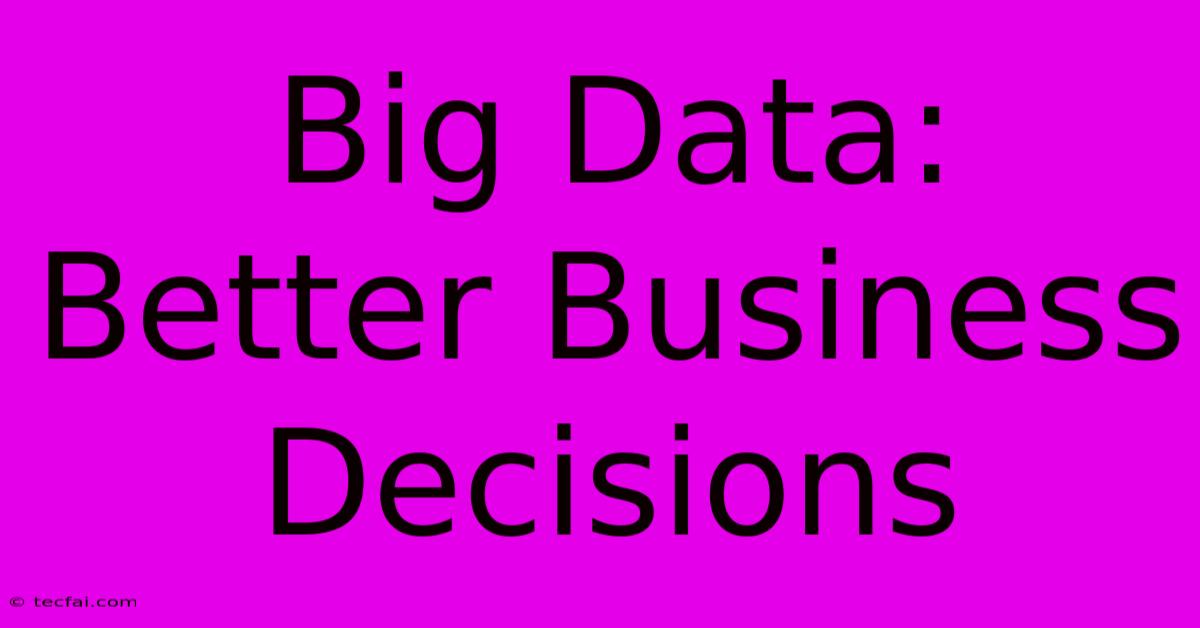Big Data: Better Business Decisions

Discover more detailed and exciting information on our website. Click the link below to start your adventure: Visit Best Website tecfai.com. Don't miss out!
Table of Contents
Big Data: Better Business Decisions
In today's rapidly evolving digital landscape, businesses are awash in data. From customer interactions to operational metrics, the sheer volume, velocity, and variety of information can feel overwhelming. But this data isn't just noise; it's a goldmine of insights waiting to be unearthed. Harnessing the power of big data analytics can significantly improve business decisions, leading to increased efficiency, profitability, and competitive advantage.
Understanding the Power of Big Data Analytics
Big data analytics involves the process of examining large and complex datasets to identify patterns, trends, and anomalies that can inform strategic decision-making. It's about moving beyond simple reporting to uncover actionable intelligence that drives tangible results. This isn't just about crunching numbers; it's about understanding the story those numbers tell.
Key Benefits of Big Data for Businesses:
-
Improved Customer Understanding: By analyzing customer data – browsing history, purchase patterns, social media activity – businesses can create more personalized experiences, targeted marketing campaigns, and better customer service. Understanding individual preferences allows for highly effective segmentation and tailored messaging.
-
Enhanced Operational Efficiency: Analyzing operational data can reveal bottlenecks, inefficiencies, and areas for improvement within your business processes. This data-driven approach can optimize supply chains, streamline workflows, and reduce operational costs.
-
Predictive Capabilities: Big data allows for predictive modeling, enabling businesses to anticipate future trends and proactively address potential challenges. This can be applied to forecasting sales, managing risk, and identifying emerging market opportunities.
-
Data-Driven Innovation: By analyzing diverse data sets, companies can identify unmet customer needs and develop innovative products and services that cater to specific market segments. This leads to a competitive edge and increased market share.
-
Reduced Risk: Big data analytics can help identify and mitigate risks associated with fraud, security breaches, and other potential threats. This proactive approach strengthens the overall resilience of the business.
From Data to Decisions: A Practical Approach
Successfully leveraging big data requires a strategic approach. Here are some key steps:
1. Data Collection and Integration:
The first step is gathering relevant data from various sources, including CRM systems, e-commerce platforms, social media, and internal databases. This data needs to be integrated and cleaned to ensure its accuracy and reliability. Data quality is paramount; garbage in, garbage out.
2. Data Analysis and Interpretation:
Once the data is prepared, sophisticated analytical techniques are employed to uncover meaningful insights. This may involve using machine learning algorithms, statistical modeling, and data visualization tools to identify patterns and trends. The key is to present the data in a clear and understandable manner, avoiding overly technical jargon.
3. Actionable Insights and Implementation:
The ultimate goal is to translate data insights into actionable strategies that improve business outcomes. This requires a clear understanding of the business objectives and the ability to link data analysis to specific actions. Implementation requires collaboration between data scientists, business leaders, and operational teams.
Overcoming Big Data Challenges
While the benefits are substantial, implementing big data solutions presents challenges:
-
Data Security and Privacy: Protecting sensitive customer data is crucial. Robust security measures and compliance with data privacy regulations are essential.
-
Data Storage and Management: Handling massive datasets requires significant storage capacity and efficient data management systems. Cloud-based solutions are often employed to address this challenge.
-
Expertise and Skillset: Analyzing big data effectively requires specialized skills and expertise in data science, statistics, and data visualization. Investing in training and recruiting skilled professionals is vital.
Conclusion: Embracing the Future with Big Data
Big data is no longer a futuristic concept; it's a critical component of successful businesses across all industries. By embracing a data-driven approach and investing in the necessary infrastructure and expertise, companies can unlock valuable insights, make better decisions, and gain a significant competitive advantage in today's rapidly changing market. The power of big data is in its ability to transform raw information into actionable knowledge, driving growth and shaping the future of your business.

Thank you for visiting our website wich cover about Big Data: Better Business Decisions. We hope the information provided has been useful to you. Feel free to contact us if you have any questions or need further assistance. See you next time and dont miss to bookmark.
Featured Posts
-
Brighton Vs Southampton Premierliga Lewendige Stroom
Nov 30, 2024
-
Transforming India Top 5 Analytics
Nov 30, 2024
-
Vaclav Cernys Rangers Europa Plea
Nov 30, 2024
-
Unveiling Notre Dames Renewed Interior
Nov 30, 2024
-
Al Nassr Oorwin Damac 2 0
Nov 30, 2024
